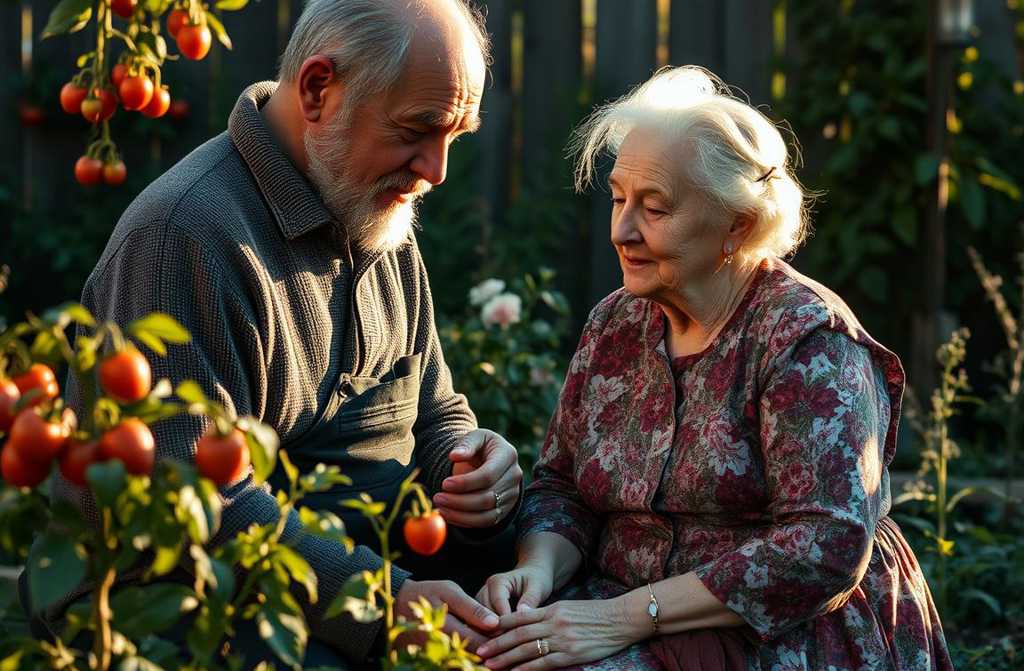The Cottage
A small cottage village near a quiet town in Yorkshire. Our place stood in a row by the riverbank. Next door was the home of Walter and Margaret, then old Grannys cottage. Beyond that, of course, were more houses, but they dont concern us now.
Walter had bought the plot seven years prior, and construction began at once. Machines rolled in, labourers from nearby towns, gravel laid, foundations dug, beams raiseda proper house and a shed went up between May and September. Soon, a grand home stood there, complete with a well, a summer kitchen, barns, a shed, and a garage. It was never quiet! Walter didnt just bark ordershe tied rebar, hauled timber, mixed concrete, and wired the place himself. Hardworking folk, these Yorkshire types. The neighbours bore it patiently, knowing a man was settling in for good. All except Granny. Every day, her shrieking carried over the fields.
Morning. The bus from town rolled in. Granny always stepped off firstno one ever called her anything else. Shed scurry to her cottage in a faded grey smock, a black kerchief, and scuffed shoes, clutching a tattered bag and a five-litre jug of water. The river wasnt fit to drink fromnot a mountain stream but slow and boggy, turning green in summer. Most fetched drinking water from town. Some had wells, but the water stank of sulphur, no matter how deep they dug. Only good for the garden. Those by the river had pumps and pipes running to it. Walter alone had a proper well and a pump station.
But I digress.
Granny would storm onto her plot and the shouting began. The tractor reeked of diesel. The pile-driving was too loud. The labourers chattered. Walters house blocked the sun from her strawberries (though hed kept to every rule). Theres always something to moan about, and Granny was a master. Walter endured every name under the sunbastard, brute, fool, wretchher insults never ran dry.
Walter carried on, ignoring her.
But sometimes, stepping out for a smoke by the fence, hed mutter in his deep voice:
“Granny, youre like a horsefly on a summers day. Either youll drain a man dry, or hell have to swat you.”
“Threaten me again, you devil!” shed screech. “Ill burn your fancy house down! Think youre lord of the manor, do you?”
Needless to say, my summers there werent restful. I visited less often.
Years passed. Walter and I werent friends, but we got on. Turned out he had two passions: classic rock and tomatoes.
Hed set his stereo at a gentle volume and vanish into his greenhousea grand thing, that. Walter knew everything about tomatoes. Tracked every new variety, fed them by the almanac, swapped the soil each spring after fumigating the place. Laid down manure, then mulch, draped the inside with fleece to shield the plants from frost or scorching sun, hung infrared lamps in spring and autumn
This wasnt the Mediterranean! In Yorkshire, tomatoes didnt just growthey survived. Doors opened at dawn, shut at dusk. If the day turned chilly or wet, you only opened the leeward side Such was life.
Ever heard a burly man talk to tomatoes? I have. Like they were his children. Gentle, coaxing. Pruning, feeding And yet, in town, they said Walter was a hard man at worka foreman, strict but fair. But here Well, I kept his secret.
Forgot about Granny? Dont. Turns out, she hated rock. Not a fan of Bowie, Floyd, or Zeppelin. Each evening she stayed over, the air rang with her opinions on the music and the fool who played it.
Walter fumed but never bit back. At boiling point, hed down half a pint of ale in one go, growl, switch off the stereo, and stomp inside. The volume was fine for the rest of usjust not Granny. He drank that half-pint daily. For a man his size, it was nothing, but it wore on him.
Then came the flood. Rain poured for weeks. The moors soaked it up at first, but the river swelled, dragging logs, fences, dog kennels, shedshorrible business. Folk marked the rising water with sticks. Word spread that the low road by the bog was flooding. Cars fled before they drowned. Buses stopped. Those without vehicles walked. Not panic, but close. The streets emptied.
Walter held out longest but finally tore off in his Land Rover. Halfway to town, he rememberedhed seen Granny in her garden the day before. He turned back.
“Go on without me, you brute! Ive moved my things to the roof. I wont abandon my homeitll be looted!”
Some cottages drowned. Ours stayed dry, the water stopping inches short. For a week, we didnt know. Walter and I rang each other. He was beside himselfnot for his house, but his tomatoes. Hed forgotten to open the greenhouse! Under that sun, theyd wither without water.
When the flood eased, we returned. Walter came over with a jug of ale, and we drank.
“Tom,” he said, “I dont get it. The greenhouse was watered. The doors were open. I know I left them shut in the rushthe water was rising!”
I walked the lane, asking whod stayed. Everyone had gone.
“Except Granny.”
“Except Granny,” Walter echoed, glancing toward her cottage. “No. Weve been at each others throats for years!”
“Except Granny,” I said again.
He knocked back his ale. “I dont believe it.”
Granny left when the buses ran again.
Next day, she returnedhauling water in buckets. Her little pump mustve washed away. Walter saw her too. Slipped twice, soaked herself, but never cursed.
Walter left and came back with pipes and fittings. That night, hammering and sawing echoed from his place.
“Neighbour,” I asked next morning, “Who were you wrestling last night?”
“Bought pipes yesterday. Granny was gone, so I ran a line from my pump to her plot. Saw her crawling with those buckets”
Two weeks later, Walter invited me for the first tomatoes and a barbecue. Seven sharp. I brought ale and homemade cider.
“Shall we start, or wait?” I asked.
“Give it fifteen minutes.”
“For whom? Margarets already here.”
The gate creaked. In walked Granny.
But not as we knew her. Hair neatly combed, a floral dress, smart sandals, a shawl, even amber beads.
“Room for one more?” she smiled.
“Come in, Mary,” Walter said warmly.
I was dumbstruck.
We sat late, drinking, eating. Mary spoke of her lifethe orphanage, raising two children alone after her husband died, how theyd scattered across the country, her grandkids Forty years on the railways, a veteran of labour.
Later, she and Margaret sang old songs.
Walter and I listened, smoking. Smiling. Sipping ale.
“Walter,” she said, “Margaret told me about the seaside. You should go. Ill tend your tomatoes.”
“Was it you?” I blurted. “During the flood?”
“Aye. Saw how he cared for them. Talked to them like babes.” She cackled, eyeing Walter. “Felt sorry for the poor things!”
Walter took that holiday.
After, we listened to rock againbut only from noon till two. For Mary.







